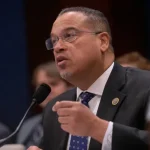Even a few days before a Manhattan jury acquitted Daniel Penny, the Marine veteran who was on trial for the death of Jordan Neely, Andre Zachery, Neeley’s father, was in a New York state court suing Penny.
According to The New York Times, Neely’s father accused Penny of “negligence, carelessness and recklessness” in the suit, filed Dec. 4, which sought damages for physical assault and battery.
The details of what happened on May 1, 2023 — when Penny subdued Neely on a New York City subway car as Neely was threatening passengers, subsequently ending in Neely’s death — are well-known by this point. This includes the jury’s acquittal of Penny on criminally negligent homicide charges Dec. 9. Manslaughter charges had been dismissed by the judge the week prior after the jury failed to reach a verdict on them.
Moreover, the details of how Neely deteriorated through a cycle of familial dysfunction, crime, and mental illness are also well-cataloged.
We can track it all the way from his mother’s murder at the hands of her boyfriend in 2007, when he was 14, to his troubled time in the custody of his grandparents, to his time as a Michael Jackson impersonator in the subways, to his history with the city’s criminal justice and mental health systems, to his increasingly violent behavior, to the events of the day he died.
This is all provided, in one way or another, in tawdry, nearly baroque detail by a media, which vacillated between painting a picture of St. Jordan of the F Train and blaming his well-documented outbursts of criminally violent behavior on systemic failure, something Daniel Penny could and should have cured with just a calming word or two.
But little is known about the relationship between Andre Zachery, the man suing Daniel Penny, and his son. In fact, this seems almost by design; while Zachery was a constant presence in the Manhattan courtroom where Penny was eventually acquitted, we hear little about the presence Zachery had in Jordan Neely’s life.
“I just want to say I miss my son. My son didn’t have to go through this. I didn’t have to go through this either. It hurts. It really, really hurts,” Zachery said outside the courtroom after the verdict.
“I had enough of this, the system is rigged.”
Is Andre Zachery simply looking for a payday?
Yes: 100% (2048 Votes)
No: 0% (7 Votes)
OK, then. Zachery sat down with ABC News to talk about the lawsuit; if ABC News interviewer Linsey Davis asked Zachery any in-depth questions about their relationship, they went to no pains to disclose what the answers to them were.
Instead, this is the exchange we got about their relationship and what Daniel Penny ought to have done:
ABC NEWS: Mr. Zachery, tell us about your son. What you miss most about him?
ZACHERY: Well, I miss his voice. I miss being around him. Miss him dancing.
ABC NEWS: If you could talk to Daniel Penny directly, what would you say?
ZACHERY: Why you didn’t say you was sorry, man? Come on, man. Why you didn’t say nothing?
ABC NEWS: Would that have mattered?
ZACHERY: It sure would have.
Elucidating stuff, this is not.
And again, I cannot be clear enough that we don’t have a media breadcrumb trail of the dysfunction and turbulence that characterized Neely’s 30 years upon this earth so much as we have a trail of oversized bread loaves, each pointed to eagerly by those chronicling this circus.
There was the 2007 murder of his mother, who had custody of him; Christie Neely, 36, was murdered by her live-in boyfriend, Shawn Southerland, then 50, in Bayonne, New Jersey.
“The relationship had been crazy … a fight every day,” Neely testified. He said he noticed his mother was missing when she didn’t wake him up for school as she normally did. When he dressed and left his room, he said he saw Southerland “acting strange.” When he asked to see his mother, “Southerland blocked him from entering the bedroom. [Neely] said the bedroom door was padlocked,” NJ.com reported in 2012.
Mentions of Andre Zachery in the article: Zero. Mentions of him in his son’s life: Zero.
Then, less than two weeks after Neely’s death, the U.K. Guardian — the official bleeding heart of Britain’s liberal media — chronicled his struggles with mental illness, the law, and the authorities in far greater depth in a piece titled, “‘It’s a failure of the system’: before Jordan Neely was killed, he was discarded.”
“Neely was struggling to stay afloat. After his mother was murdered by his stepfather in 2007, when Neely was 14, he developed severe depression and PTSD, and also had autism and schizophrenia, according to relatives. He bounced between homes before ending up in the foster care system. … he also began crossing paths with police — telling them he was hearing voices,” the outlet reported.
“Jordan was reportedly on the ‘top 50’ list, a city roster of homeless people considered to be most urgently in need of help. In a city filled with social services, how could this happen? What were the institutions that were supposed to help him — and how did his journey through the safety net end on the floor of the F train?”
The piece noted that he “moved in with his grandparents but acted out and cut school” after his mother’s death.
“He will not listen to me or his grandfather,” his grandmother told officials in 2009.
In 2010, the Guardian noted, he allegedly threatened to kill his grandfather and left the household, sleeping in the hallway of his building. Then: “Neely became one of roughly 11,000 other children, more than half of them Black or Latino, in New York City’s foster care system. Many of the children come in with significant trauma, only to encounter further abuse or unsafe conditions in foster homes. A significant number of children in foster care end up dropping out of school, as Neely reportedly did.”
Number of paragraphs in that story: 54. Number of mentions of Andre Zachery or any mention of Neely’s biological father in any way, period full stop: You don’t even need to ask — Zero.
We know squat about the relationship Andre Zachery had with his son or the efforts he made — if any — to intervene at critical points in his child’s life. This, it appears, is by design. His mother was murdered by a partner who fought with her “every day.” Mentions of dad intervening: None.
He moved in with his grandparents but moved out after recalcitrance and threats toward them. Evidence of dad trying to step in: Absent.
He then descended into a spiral of mental illness, which ended on an F Train on May 1, 2023, when he threatened passengers by saying — according to the Times — “I don’t have food. I don’t have a drink. I’m fed up. I don’t mind going to jail and getting life in prison. I’m ready to die.”
He did. He died because his mental illness put him in a position where he needed to be stopped, lest he harm innocent bystanders. Numerous studies have linked mental illness and poorer outcomes with households with an absent father. Evidence Zachery made an attempt to not be absent: Not forthcoming in the 19 months since Neely’s death.
In a case where every detail of Neely’s sad life has been described in cruel, lurid detail — and where any member of the media, at almost any establishment media organ, would be happy to relay whatever particulars Andre Zachery was willing to feed to them with only the flimsiest filter of fact-checking between his mouth and the credulous publication of said particulars — what we know about Andre Zachery is that he thinks “the system is rigged” and he “miss[es] his voice … miss[es] him dancing.”
Now he wants to sue Daniel Penny for physical assault and battery after his son had a history of physical assault and battery — and, on the day he died at age 30, he was threatening to physically assault and batter the riders Penny restrained him from harming.
Mr. Zachery, it’s more than fair that we ask you: Where were you for 30 years?
Advertise with The Western Journal and reach millions of highly engaged readers, while supporting our work. Advertise Today.






